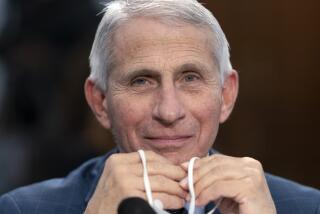2 Embattled Leaders Quit Reagan’s Panel on AIDS : No. 2 Man Cites Lack of Administration Support
- Share via
WASHINGTON — The two top members of President Reagan’s controversial AIDS commission quit today, with the outgoing vice chairman complaining about internal turmoil and lack of Reagan Administration support.
Chairman Dr. W. Eugene Mayberry and Vice Chairman Woodrow Myers Jr. announced their resignations and White House officials said a formal announcement naming retired Adm. James Watkins, another commission member, as Mayberry’s successor was planned. Watkins served as chief of naval operations from 1982-86.
A spokesman for Mayberry, Michael O’Hara, said the Mayo Clinic head “has resigned, effective today. He has not stated any specific reasons. I think he prefers not to get into any specifics.”
But Myers, Indiana’s state health commissioner with experience as a San Francisco health official, departed with a volley.
‘No Longer . . . Effective
“I feel that I can no longer be effective in attempting to reach the goals outlined in the President’s order creating the commission,” he said at a news conference in Indianapolis.
“We had to deal with very difficult problems over the past several months,” Myers said. “There was not a complete support of Dr. Mayberry’s position in the commission nor my role as vice chairman. We did not receive a full degree of support from the Administration.”
Myers, named vice chairman by Mayberry, cited problems with the commission’s inability to reach agreements on crucial AIDS-related issues and inadequate representation of doctors and other health officials on the committee.
“It is my sincere hope that should new appointments be made, that the individuals have an established background in public health and or in the care of patients with the acquired immune deficiency syndrome,” he said.
‘Complete Turmoil’
The panel had been criticized in the scientific community for having a majority of members who had no experience either in AIDS research or care. Most members also have no public health experience, but are instead drawn from a variety of communities, including business and religion.
Richard Dunne, executive director of Gay Men’s Health Crisis in New York, a nonprofit education group, said: “It’s clear from these two resignations the commission is in complete turmoil.
“We regret this further setback in the commission’s work. We as a nation can ill afford this loss of time. The AIDS epidemic is out of control and, it seems, so is the President’s AIDS commission.”
Mayberry, an endocrinologist and chief executive officer of the Mayo Clinic in Minnesota, had expressed unhappiness with the amount of time the chairmanship requires, according to a report in today’s Washington Post. He has said White House officials told him in June that he would need to come to Washington only a few days a month, the newspaper said.
Dismissal in September
Mayberry said last week that he offered to resign in September after dismissing Linda Sheaffer, the executive director he hired in August, according to the report.
Commission members, complaining about lack of staff leadership, had urged Mayberry to dismiss Sheaffer in favor of hiring someone with more experience in the kind of work that needed to be done.
The 13-member commission, which is charged with advising President Reagan on controlling the spread of the deadly acquired immune deficiency syndrome, has been criticized for the amount of time it has taken to get organized.
It has also been beset with reports of internal disagreements on how the commission should go about its task.
The first report of the commission, charged with advising Reagan about the disease’s “medical, legal, ethical, social and economic impact,” is due Dec. 7. Its final report is due in July.
More to Read
Sign up for Essential California
The most important California stories and recommendations in your inbox every morning.
You may occasionally receive promotional content from the Los Angeles Times.










